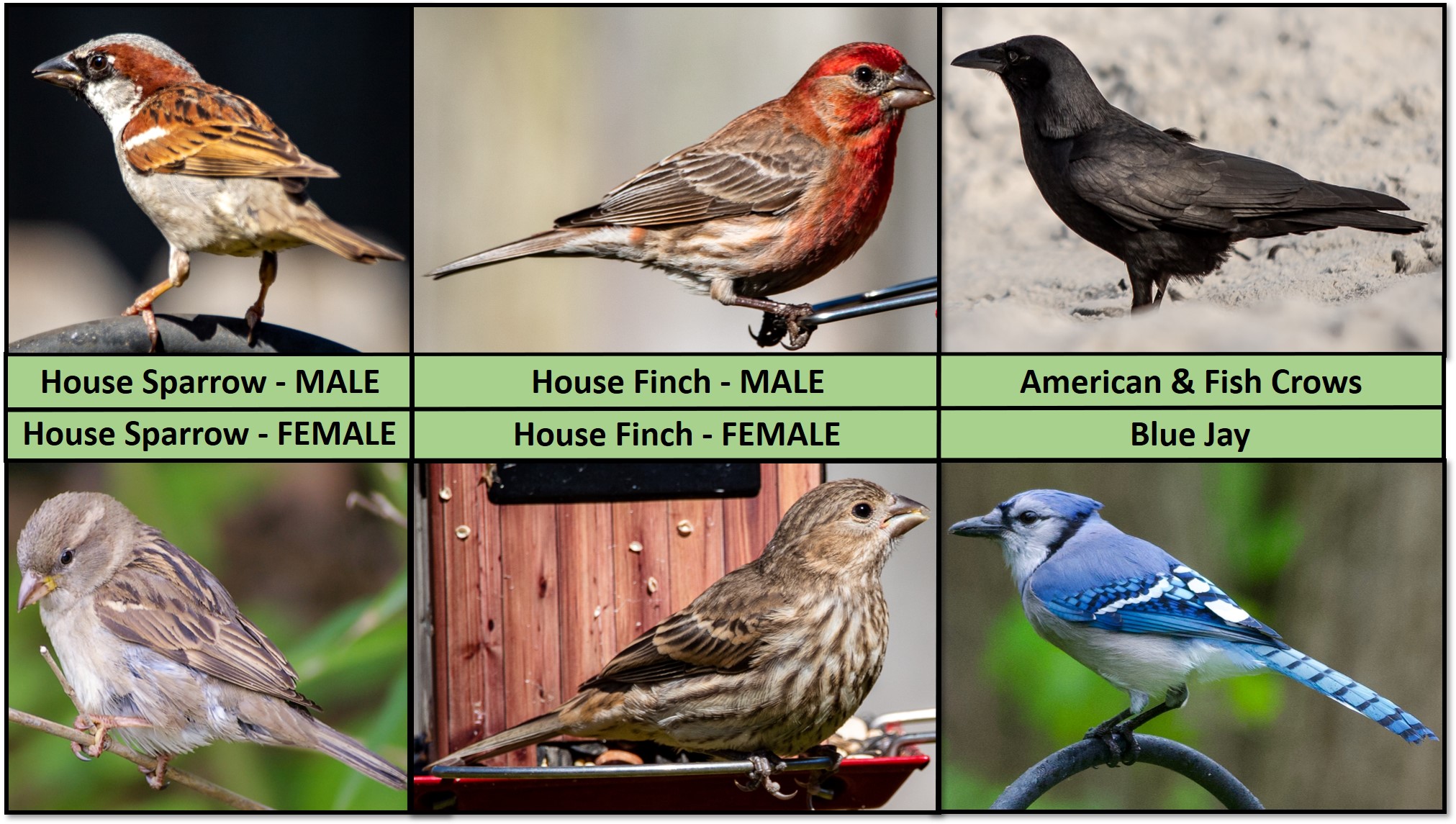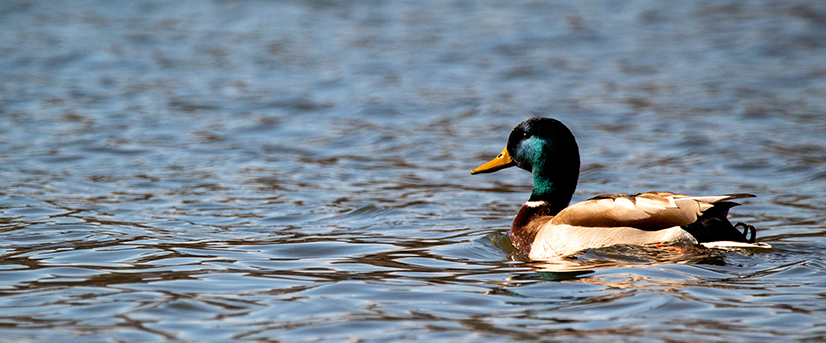SC DPH Vector-Borne Diseases Division Does Not Test for Bird Flu
Birds experiencing mass die-offs may be investigated by different South Carolina agencies depending on species. Contact the appropriate state agency for certain bird species.
You should never touch a bird (dead or alive) with your bare hands.
DPH encourages the use of disposable gloves and a mask when handling the bird in question. If gloves are unavailable, you may pick up the bird with doubled plastic bags (using caution to prevent contact with your hands).” Learn how to safely interact with and submit birds for testing.
Birds play an important role in maintaining and spreading West Nile Virus (WNV). Mosquitoes become infected with WNV when they feed on infected birds that carry the virus in their blood. After 1½ to 2 weeks, infected mosquitoes can then transmit WNV to people and other animals.
Tracking the virus in birds that have a high death rate from WNV alerts us to virus activity in a certain area of the state.
Signs of WNV illness in birds include weakness, sluggishness, shaking, seizures, inability to walk/fly/perch, blindness, or lack of fear of people.
You Can Help
Please help DPH monitor West Nile virus activity in South Carolina by submitting bird species that are not part of a mass die-off. Almost all WNV-positive birds are found singly and not as part of a mass die-off at a single time and place.
DPH monitors WNV activity in birds between mid-March and November when mosquitoes are most active in South Carolina. When we find evidence of WNV in birds, we contact local government officials or mosquito control in the area where the bird was found. Some SC communities do not have mosquito control in their area.
Our early warning gives local government or mosquito control providers an opportunity to help safeguard the health of residents by boosting mosquito control and/or reminding citizens to protect themselves from mosquito bites or eliminate mosquito breeding.
What Kinds of Birds Do We Test?
Report or submit deceased songbirds not part of a mass die-off to DPH from mid-March through November. Any songbird can be submitted, but Blue Jays, Crows, House Sparrows, and House Finches are chosen as target species because of their abundance, high infection rates compared to other birds, and likelihood of dying from West Nile virus. See instructions below for submitting bird species experiencing mass die-offs.
Descriptions of Bird Species

- Crows (American Crow and Fish Crow): 17 to 21 inches long; body all black. Note: A grackle is similar looking to a crow: 11 to 13 inches long; head with a green or purple sheen; body is black or brown.
- Blue Jay: 9 to 12 inches long; upperparts bright blue; underparts whitish gray; head with gray-blue crest; throat and head with continuous black collar (necklace); wings and tail bright sky-blue with heavy black barring; bill, legs, feet, and eyes black.
- House Finch: 6 inches long; upperparts grayish-brown, underparts whitish with streaks of brown, brown and gray; wings with two narrow whitish bars; upper tails brown.
- Male house finch: face, neck, shoulders, rump either rosy red, yellow, or orange, with color sometimes extending down belly and back between the wings.
- Female house finch: red, yellow, or orange color lacking; face plain and unmarked.
- House Sparrow: 5.5 to 6.5 inches long.
- Male house sparrow: Head gray; cheeks gray or white; throat (“bib”) black with white collar; Upperparts reddish-brown with black streaking; underparts pale gray; wings with a single white bar.
- Female house sparrow: Upperparts buffy brown with black streaking; underparts dingy grayish brown; wings with a single white bar.
- Other songbirds: Other songbirds will be accepted. These birds exclude domesticated poultry (chickens, turkeys, quail, pheasants, ducks, geese), wild waterfowl, shorebirds, and raptors (eagles, hawks, falcons, vultures, owls, and osprey). Birds from veterinarians affiliated with zoos, raptor rehabilitation centers, and similar facilities will be accepted if WNV is suspected as the cause of illness.
- See how to report other types of dead or sick birds.
How to Report Illness in Birds or Submit Dead Birds to DPH
- Submit only recently deceased wild birds that show no signs of physical trauma or decay. In other words, do not submit roadkill or birds with missing eyes, obvious odor, skin discoloration, feathers or skin that easily rub off, maggots, or gunshot or other types of wounds.
- Make note of the dead bird’s location. A bird will not be tested if its location of origin is unknown. Provide detailed driving directions, using distances from nearby road intersections, if no street address is available.
- To protect your own health, follow these instructions when picking up a dead bird:
Do not touch a bird (dead or alive) with your bare hands. Either:- Use gloves, or
- Pick up the bird with doubled plastic bags that have been turned inside out (covering your hand). Invert the doubled bags over the bird (uncovering your hand) and seal them with the bird inside.
- Wash hands thoroughly with soap and water.
- Place the bagged bird on cold packs or keep it cool until the bird can be refrigerated in a non-food refrigerator. Freeze the bird carcass in a non-food freezer if it cannot be shipped or delivered for testing within 36 hours of collection.
- Use the Dead Bird Reporting and Submission Form to submit or report dead birds to DPH at local public health offices. *Locations that offer only Women, Infants, and Children (WIC) Services cannot accept birds. Staff will make sure the bird qualifies for testing and then send it to the DPH lab in Columbia.
Getting Lab Results
Testing can sometimes take up to four weeks to complete based on our workload. Vector-Borne Disease Lab staff will notify you of the results.
Reporting Other Types of Dead or Sick Birds

Other SC agencies also test or track certain types of sick or dead birds:
- Domesticated Poultry (chickens, turkeys, quail, pheasants, ducks, geese):
- To report sick or dead poultry, call Clemson University Livestock Poultry Health Division at (803) 788-2260 or fill out this Online Report Form.
- Permitted commercial poultry growers must call a local DPH Regional office or 24-hour emergency response at (888) 481-0125 if greater than 10% mortality.
- Wild Waterfowl, Shorebirds, and Songbird Die-Offs (5 or more dead in one place):
- Call SC DNR, Wildlife and Freshwater Fisheries Division at (803) 734-3886.
- Call USDA-WS at 1-866-487-3297 to report wild bird die-offs or unusual signs.
- Eagles (1 or more dead):
- Call SC DNR, Wildlife and Freshwater Fisheries Division, Assistant Chief of Wildlife at (803) 734-3938.
- Raptor Die-Offs (hawks, falcons, vultures, owls, and osprey):
- Call SC DNR, Wildlife and Freshwater Fisheries Division, Assistant Chief of Wildlife at (803) 734-3938.
- Call USDA-WS at 1-866-487-3297 to report wild raptor die-offs or unusual signs (5 or more birds)

